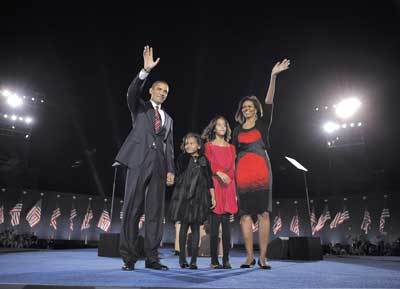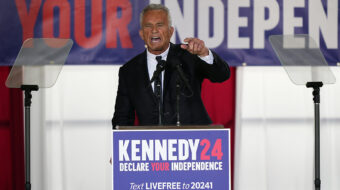
CHICAGO — With the nation and world watching, lights sparkled across Grant Park on Election Night as more than 240,000 Americans of all races and backgrounds gathered to hear President-elect Barack Obama call on them to “join in the work of remaking this nation the only way it’s been done in America for 221 years — block by block, brick by brick, calloused hand by calloused hand.”
Tears, hugs and cheers swept the streets of this city of Big Shoulders, celebrating the election of the nation’s first African American president and Chicago’s adopted son, and the remaking of the nation’s political landscape. It was a stunning rejection of the right-wing, pro-corporate agenda and hate-mongering put forward by the McCain-Palin campaign, and an expression of the mass desire for policies that benefit Main Street Americans and mend our image abroad.
With a record voter turnout, Obama decisively won the electoral vote tally — 349 to McCain’s 162, with 27 undecided at press time — and won 52.3 percent of the popular vote, topping all Democratic presidential victories since Lyndon Johnson’s landslide win over Barry Goldwater in 1964.
Chris Lane, president of Communications Workers Local 2201 in Richmond, Va., was exultant that Obama carried the Old Dominion state, the first Democrat to carry Virginia since 1964. “We had a goal of getting 300,000 union members and their families to the polls in Virginia and I think we achieved it,” Lane said in a telephone interview.
“This was labor getting back to the grassroots, an approach that made labor so strong back in the 1940s and 1950s,” said Lane, 33, son of a union coal miner.
“Never in my short career have I seen labor come together so strongly,” he said. “Truly, this is the rebirth of the labor movement.”
Lane, who is white, called Obama’s victory speech “the most powerful, moving speech I have ever heard in my lifetime.”
“I served in the Marine Corps and traveled to a lot of countries,” he said. “I’m so excited about how we as a nation are going to be seen around the world with Obama as our president.”
In his Election Night speech Obama cautioned, “This victory alone is not the change we seek — it is only the chance for us to make that change.” Repeating a central theme of his grassroots-powered campaign, he told the crowd and the millions watching on TV, “It cannot happen without you.”
Obama spoke of 106-year-old Ann Nixon Cooper, who had stood in line to vote that day in Atlanta. She was born just a generation after slavery, “when someone like her couldn’t vote for two reasons — because she was a woman and because of the color of her skin.” Her life, Obama said, exemplified “the heartache and the hope; the struggle and the progress; the times we were told that we can’t, and the people who pressed on with that American creed: Yes we can.”
It was an exceptionally emotional night for African Americans who grew up during Jim Crow segregation and the civil rights struggles of the 1950s and ’60s.
‘This is an unbelievable night,’ a “nonviolent revolution,” said Rep. John Lewis (D-Ga.), who was brutally beaten by police during the 1965 “Bloody Sunday” civil rights march in Selma, Ala. “I never imagined, I never even had any idea I would live to see an African-American president of the United States,” he told MSNBC, his voice heavy with emotion. “Some people gave their very lives, and some of us gave a little blood, to make tonight possible.”
Speaking from a celebration at Atlanta’s Ebenezer Baptist Church, the home church of Dr. Martin Luther King Jr., Lewis said, “Just think, a few years ago in this part of America people couldn’t even register to vote … and today these same individuals used their simple vote to help elect the next president of the United States, an African American, a young man, who will be a great leader.”
United Steelworkers President Leo Gerard sent a congratulatory letter to Obama, hailing “this great victory.”
He pointed to “the work our members have done … in this campaign for change.” More than 10,000 USW members, he wrote, “sacrificed vacation time, personal time and family time,” made more than 1 million phone calls to USW members, knocked on doors, handed out hundreds of thousands of leaflets at thousands of USW workplaces — most in key ‘battleground’ states “where they often led the way for you.”
The Steelworker leader told the newly elected U.S. president: “Know this: The United Steelworkers are with you. We understand the challenges you face and the economic chaos you are inheriting. We will be with you every step of the way, and we stand ready to put as much energy into driving your agenda forward as we have put into helping you get elected.”
In a separate message to local union leaders and staff, Gerard wrote, “Our work is not over – it has only just begun.”
“President Obama will never be able to accomplish these changes alone. We must be the ones to drive this agenda forward … Nothing that was ever worth so much came for free. Power is not relinquished without struggle.”
Election Day 2008 was a day of countless stories.
In Wilkinsburg, Pa., with the polls closing soon, Serena Nelson was caught across town in the wrong voting district. Raising two children on a medical secretary’s wages, she had moved and had not had time to change the address on her voter registration.
‘Come on,’ said a USW poll worker. ‘Jump in the van — we can make it.’
At 27, she was voting in her first election. ‘I was starting to cry,’ she said, ‘because change means so much to me. I know things do not have to be this way — wars, every company making life so hard, making me feel so bad. Barack brought us together, showed us we count. People from all walks, places, we all just want a better life, fairness, justice.’
Nelson got to the polls just in time and cast her vote. With a wide smile she told her whimpering baby, ‘Look Devin, Mommy voted. Look, here’s the stub.’
suewebb@pww.org. Teresa Albano, Tim Wheeler and Denise Winebrenner-Edwards contributed to this story.












Comments